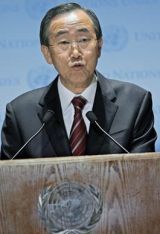Sending peacekeepers to Chad risky – UN chief
Feb 21, 2007 (UNITED NATIONS) — Secretary-General Ban Ki-moon warned the Security Council that sending U.N. peacekeepers to Chad carries “serious risks” because of the volatile situation in the central African nation and possible attacks by rebel groups.

Unlike his predecessor, Ban made no recommendation on whether the council should deploy a U.N. peacekeeping force to Chad and the Central African Republic to help thousands of civilians caught in local fighting and the spillover of the Darfur conflict in neighboring Sudan.
In one of his final reports before stepping down as U.N. chief on Dec. 31, former Secretary-General Kofi Annan recommended against deploying U.N. peacekeepers to the two countries until all parties agree to a cease-fire and start talks aimed at a political solution. He cited the risk to troops from continuing hostilities and very difficult logistics.
The Security Council rejected Annan’s recommendation, and asked the U.N. team that had gone to Chad and the Central African to return to the region to visit places they didn’t get to because of fighting and make “updated and finalized recommendations on the size, structure and mandate of a U.N. multidimensional presence.”
In a 27-page report to the council, based on the U.N. team’s return visit, Ban said if the council decides to establish a peacekeeping mission it should assist in protecting civilians who have fled their homes and in maintaining law and order in refugee camps. It should also deploy at key border locations to reduce tensions and prevent cross-border attacks.
Eastern Chad is facing “a multi-faceted security and humanitarian crisis,” which includes ongoing clashes between government forces and Sudan-based Chadian rebels and cross-border attacks on civilians by Sudan-based militia, the report said.
The region is also wracked by ethnic violence, inter-communal tensions and banditry, which along with the other clashes have led to an increase in the number of internally displaced Chadians from an estimated 92,000 in December to approximately 120,000 by Feb. 1, the report said. In addition, Chad is hosting 232,000 refugees from Sudan, primarily from Darfur.
By contrast, Ban said, the situation in the northeastern Central African Republic was less acute following an agreement between the government and rebel groups to negotiate an end to their conflict, which he called “an encouraging development.”
Ban proposed two possible military options for Chad _ a 6,000-strong force backed by 20 helicopters and an observation aircraft and a 10,900-strong force backed by 11 helicopters and two observation aircraft. He also proposed that some 800 Chadian police be loaned to a U.N. peacekeeping operation to help protect a dozen refugee camps and key towns where Chadians have fled, along with 260 international police.
In northeastern Central African Republic, he said, a modest deployment of approximately 500 U.N. military and police personnel “would have a stabilizing effect on the situation.”
But the secretary-general cautioned that “eastern Chad is not a conventional peacekeeping environment” because of unrest in the region, hostilities between the government and opposition groups, and the failure of efforts at political dialogue to gain momentum.
“The open-ended deployment of a United Nations peacekeeping force into this challenging environment would therefore carry distinct and serious risks,” Ban said. “Chief among these is the possibility that armed groups may view a United Nations force as interfering with their military agenda and decide to attack it.”
A U.N. force could also find itself caught in cross-fire, he said.
To mitigate the risks, he recommended the larger 10,900-strong force as the best option because of its size and mobility.
Ban said it would also be “imperative” for the U.N. to obtain assurances from Chadian rebel groups “that they would recognize the impartial character of a United Nations presence.”
The secretary-general stressed that the deployment of any U.N. force in eastern Chad would need full support from the government.
When Assistant Secretary-General for Peacekeeping Hedi Annabi met Deby in eastern Chad on Feb. 5, Ban said the Chadian president told him he had asked the council in November to deploy a “civilian force” to the camps _ not a military force.
“Furthermore, he expressed the view that the international community was considering the deployment of a United Nations military force in Chad because Sudan had refused to accept the deployment of a United Nations operation in Darfur,” Ban said.
Deby said he wanted to see additional details about a proposed U.N. mission before making a final decision, and those recommendations were handed over, the secretary-general said.
Ban stressed that a lasting solution to the crisis in both countries depends first and foremost on their leaders. He urged the governments in Chad and the Central African Republic “to move forward rapidly and to muster the political will and establish peace and stability in their countries and in the region.”
(AP)
